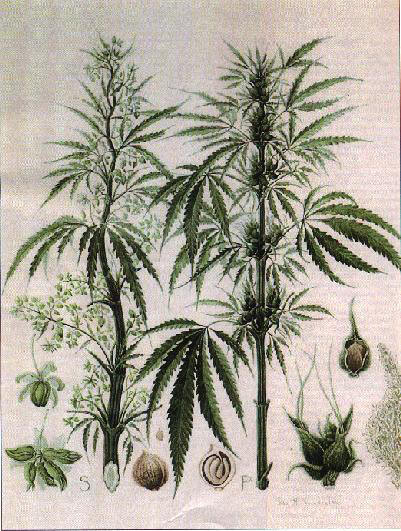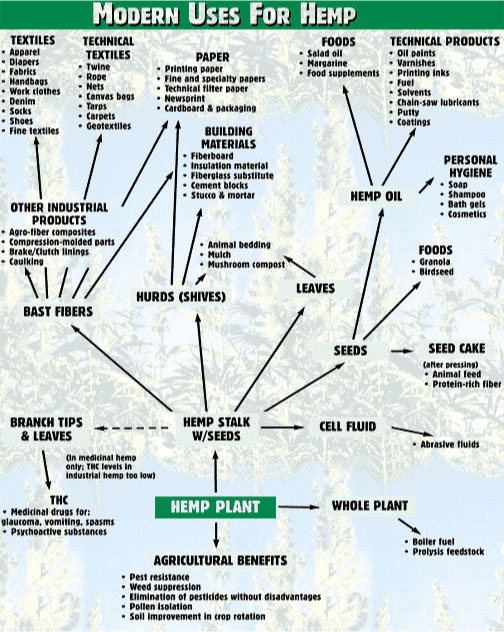So Why is Hemp Illegal?
“And I will raise up for them a plant of renown, and they shall
be no more consumed with hunger in the land.” —Ezekiel 34:29
 Tough
question! In order to explain why hemp, the most useful plant known to
mankind, became illegal, we have to understand the reasons why marijuana,
the drug, became illegal. In fact, it helps to go way back to the beginning
of the century and talk about two other drugs, opium (the grandfather of
heroin) and cocaine.
Tough
question! In order to explain why hemp, the most useful plant known to
mankind, became illegal, we have to understand the reasons why marijuana,
the drug, became illegal. In fact, it helps to go way back to the beginning
of the century and talk about two other drugs, opium (the grandfather of
heroin) and cocaine.
Opium, a very addictive drug (but relatively harmless by today's standards) was once widely used by the Chinese. The reasons for this are a whole other story, but suffice to say that when Chinese started to immigrate to the United States, they brought opium with them. Chinese workers used opium to induce a trance-like state which helped make boring, repetitive tasks more interesting.
It also numbs the mind to pain and exhaustion. By using opium, the Chinese were able to pull very long hours in the sweat shops of the Industrial Revolution. During this period of time, there was no such thing as fair wages, and the only way a worker could make a living was to produce as much as humanly possible.
Since they were such good workers, the Chinese held a lot of jobs in the highly competitive industrial work-place. Even before the Great Depression, when millions of jobs disappeared overnight, the White Americans began to resent this, and Chinese became hated among the White working class. Even more than today, White Americans had a very big political advantage over the Chinese -- they spoke English and had a few relatives in the government, so it was easy for them to come up with a plan to force Chinese immigrants to leave the country (or at least keep them from inviting all their relatives to come and live in America.) This plan depended on stirring up racist feelings, and one of the easiest things to focus these feelings on was the foreign and mysterious practice of using opium.
We can see this pattern again with cocaine, except with cocaine it was Black Americans who were the target. Cocaine probably was not especially useful in the work-place, but the strategy against Chinese immigrants (picking on their drug of choice) had been so successful that it was used again. In the case of Blacks, though, the racist feelings ran deeper, and the main thrust of the propaganda campaign was to control the Black community and keep Blacks from becoming successful. Articles appeared in newspapers which blamed cocaine for violent crime by Blacks. Black Americans were painted as savage, uncontrollable beasts when under the influence of cocaine -- it was said to make a single Black man as strong as four or five police officers. (sound familiar?) By capitalizing on racist sentiments, a powerful political lobby banned opium and then cocaine.
Marijuana was next. It was well known that the Mexican soldiers who fought America during the war with Spain smoked marijuana. Poncho Villa, A Mexican general, was considered a nemesis for the behavior of his troops, who were known to be especially rowdy. They were also known to be heavy marijuana smokers, as the original lyrics to the song `la cucaracha' show. (The song was originally about a Mexican soldier who refused to march until he was provided with some marijuana.)
After the war had ended and Mexicans had begun to immigrate into the South Eastern United States, there were relatively few race problems. There were plenty of jobs in agriculture and industry and Mexicans were willing to work cheap. Once the depression hit and jobs became scarce, however, Mexicans suddenly became a public nuisance. It was said by politicians (who were trying to please the White working class) that Mexicans were responsible for a violent crime wave. Police statistics showed nothing of the sort -- in fact Mexicans were involved in less crime than Whites. Marijuana, of course, got the blame for this phony outbreak of crime and health problems, and so many of these states made laws against using cannabis. (In the Northern states, marijuana was also associated with Black jazz musicians.)
Here is where things start to get complicated. Put aside, for a moment, all the above, because there are a few other things involved in this twisted tale. At the beginning of the Great Depression, there was a very popular movement called Prohibition, which made alcohol illegal. This was motivated mainly by a Puritan religious ethic left over from the first European settlers. Today we have movies and television shows such as the "Untouchables'' which tell us what it was like to live during this period. Since it is perhaps the world's most popular drug, alcohol prohibition spawned a huge `black market' where illegal alcohol was smuggled and traded at extremely high prices. Crime got out-of-hand as criminals fought with each other over who could sell alcohol where. Organized crime became an American institution, and hard liquor, which was easy to smuggle, took the place of beer and wine.
In order to combat the crime wave, a large police force was formed. The number of police grew rapidly until the end of Prohibition when the government decided that the best way to deal with the situation was to just give up and allow people to use alcohol legally. Under Prohibition the American government had essentially (and unwittingly) provided the military back-up for the take-over of the alcohol business by armed thugs. Even today, the Mob still controls liquor sales in many areas. After Prohibition the United States was left with nothing to show but a decade of political turmoil -- and a lot of unemployed police officers.
During Prohibition, being a police officer was a very nice thing -- you got a relatively decent salary, respect, partial immunity to the law, and the opportunity to take bribes (if you were that sort of person.) Many of these officers were not about to let this life-style slip away. Incidentally, it was about this time when the Federal Bureau of Narcotics and Dangerous Drugs was reformed, and a man named Harry J. Anslinger was appointed as its head. (Anslinger was appointed by his uncle-in-law, Andrew Mellon, who was the Secretary of the United States Treasury.) Anslinger campaigned tirelessly for funding in order to hire a large force of narcotics officers. After retiring, Anslinger once mused that the FBNDD was a place where young men were given a license to steal and rape.
The FBNDD is the organization which preceded what we now call the DEA, and was responsible for enforcing the new Federal drug laws against heroin, opium, and cocaine. One of Anslinger's biggest concerns as head of the FBNDD was getting uniform drug laws passed in all States and the Federal legislature. (Anslinger also had a personal dislike of jazz music and the Black musicians who made it. He hated them so much that he spent years tracking each of them and dreamed of arresting them all in one huge, cross-country sweep.) Anslinger frequented parent's and teacher's meetings giving scary speeches about the dangers of marijuana, and this period of time became known as Reefer Madness. (The name comes from the title of a silly movie produced by a public health group.)

